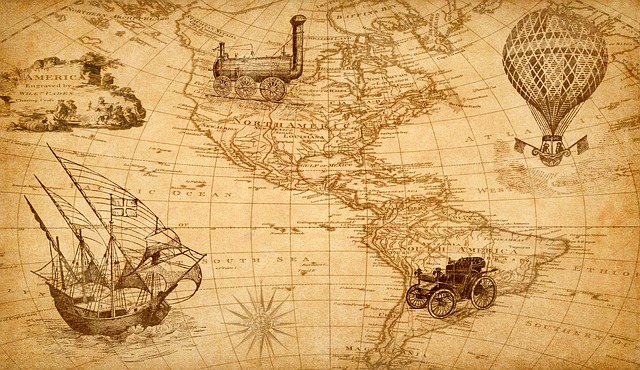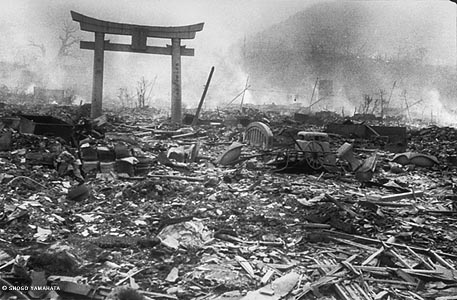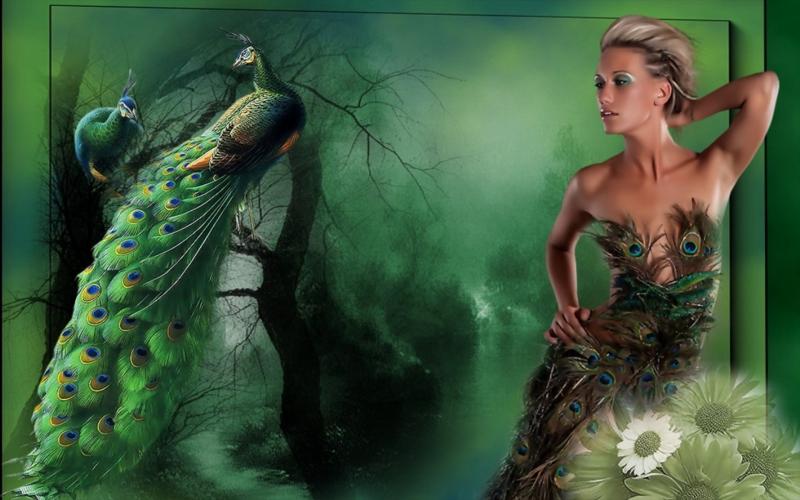A Period Piece by Patrick Ritter

A Period Piece by Patrick Ritter
Byron Morrissey gazed into the thick jungle. He inhaled deeply from a thin cigar, letting the smoke roll out slowly over his thick mustache. Next to him a small man peered intently at a glowing screen floating in front of him.
“Mr. Morrissey, sir, I have it,” he announced, craning around.
Between puffs, Morrissey said, “Excellent, Cobb. You’re sure you have all of the code?”
Cobb’s fingers floated over the virtual keyboard. After a pause he said, “Absolutely. It checks against the specimen perfectly. The genetic signature of the butterfly is now ours. All I need to do now is to transmit a copy to the onboard computer and we can be on our way.”
“And none too soon, Cobb,”
Morrissey replied. “Nineteen ten may be fine for Ecuadorian tribes, but I
much prefer our own year. He picked up a box. Inside a huge metallic-blue
butterfly stirred as the effects of the anesthetic receded. “This will
make an excellent addition to my collection, Cobb, excellent”
Morrissey looked out into the viney explosion of green. Far off, a monkey howled. “When we get back, Cobb, I want to start planning our next trip right away. This one is going to be something special, Cobb, really big.” His eyes lit up momentarily then faded to grey. He took a long draw on his cigar, then called for the pilot.
The sun sank lower into the jungle, sending spears of light reflecting off a silver platform hanging a meter off the ground. Morrissey climbed onto one side of the platform, and stood musing, almost oblivious to his surroundings. On the other side of the platform, their time pilot, a serious uniformed man, stood over a control panel inputting commands. For a moment, sunlight danced across his chest, striking the gold insignia over his pocket that read TIME TRAVEL LIMITED.
The Ecuadorian jungle swayed. It blinked, once, and the platform was gone without a sound. Nothing was left behind except footprints. Soon the jungle would reclaim those too and no trace would remain of the expedition. A blue butterfly fluttered back into the jungle.
A month later, Byron Morrissey poured himself a brandy in his library. His remote mansion looked about the same in the year 2120 as it had for almost 300 years, steeped in permanence and English fog. It was the perfect repository for his priceless galleries.
Morrissey collected things, a lot of things. With his vast inherited wealth, he had the money, and the time, to assemble masterpieces of painting, sculpture, holos, and virtual artwork. For a while it gave him satisfaction to know that he was the master curator of one of the world’s finest art collections. But then he grew bored. So he began to collect other things. In his library vaults, first editions of the classics collected no dust. Living masterpieces grew in his greenhouses. Champion breeds graced his stables.
He also collected wives, three of them, with similar outcomes – beauty at first, then boredom. Pacing around his library, he paused in front of a holo-statue of a former wife. He collected memories too, the “classic moments” he called them, which he held like snapshots in time, viewing from different perspectives, savoring like a fine wine. It seemed easier that way, controlled and predictable. Then the memories dimmed, and he needed more. Consumed with a passion out of scale even for the idle rich, he lived through his collections. He retreated into them year by year, convincing himself his true calling was to preserve masterpieces. Yet it was a solitary existence. Fifty-three and still obsessed, he was an addict in denial.
Now he had an entirely new playground: time travel. A few years earlier, when travel to the past became possible, Morrissey eagerly bought his way in, hoping to enlarge his collections. He looked in on the great artistic events: Michelangelo at the Sistine Chapel, Shakespeare at his pub. He watched, but only that. Nothing could be removed from the past, by physical laws Morrissey refused to accept. The ancient masterpieces had to remain ancient. Stuck on a single track of time, they could only reach his halls by the slow progression of the ages.
Then, through one of the time travel companies he funded, he learned how biological masterworks could be brought back. With only a bit of skin or leaf, nature’s genetic code could be unraveled. Although physical objects couldn’t be retrieved from the past, information could. Genetic blueprints could be carried back to the present in computers, neat binary suitcases for a trip through time. Then, with bio‑chemical reconstruction, extinct species jumped back to life across millions of years.
Morrissey and his genetic engineers returned with the unique and bizarre. In his aviaries, rare and beautiful birds flew again. Extinct for decades, polar bears now lived in his reconstructed arctic habitat. The specimens that couldn’t survive this ultimate future shock were stuffed or framed and were displayed in somber halls. Even the genetic codes themselves become a passion to Morrissey. At times, late at night, he sat blinking before a terminal, rummaging through his computer files, counting his codes.
On this night Morrissey swirled his brandy. On the table next to him was a rare blue Ecuadorian butterfly, freshly mounted. A fire hissed and popped in the massive hearth. Morrissey drank deeply. He turned to Andrew Cobb, his remarkable genetic engineer.
“So, Cobb, Morrissey said, “you’re sure we can go as far back as the Late Cretaceous? A couple hundred years is one thing, but will we be able to survive a trip back 70 million years?
“It’s all about alt-matter and divergent pathways, Mr. Morrissey,” Cobb replied.
“How so?”
“Traveling back in time is a matter of twisting space-time to create a transversible wormhole, a black hole shortcut to a different time track, or pathway. We’ve known for a long time that, to do that, we need to warp space-time in the opposite way, which requires matter with negative mass and negative energy density, so-called alt-matter. In 2094, when physicists discovered the means to generate and harness the large amount of alt-matter needed, it opened the door to time travel. And if I am correct, you own options to purchase over sixty percent of the available alt-matter supply in the world, which should be enough to get us back that far.”
“Quite so, Cobb. But what about our available windows between those, what do you call them, key divergences?”
“Essential divergences. Yes, according to Quantum Theory, the universe doesn’t have one unique history, but rather every possible history or pathway, each with its own probability. But when the first time travelers explored the past, they discovered that there aren’t an infinite number of alternative histories at all. Rather, time passes through essential divergences, significant events that are sort of checkpoints opening into the future. These events can’t be altered because it would create unstable future singularities for that time track.”
“And that’s why we can’t bring back a solid object, because it has to move through all of these key events?”
“Essentially, yes. And you can’t change time pathways to create a different future. For example, you can’t go back in time and prevent your birth because that event is an essential divergence on your time track. Altering it would create an energy singularity such that you would cease to exist. Endings are also key events. You can’t, for example, prevent Lincoln’s assassination. When we go back in time, while we can’t alter these essential divergences, we can jump in between them. Because we will be going back so many millions of years, there should be a substantial number of available windows that we can access. So, yes, it should be possible.”
“I tell you, Cobb, it has to be possible.”
Cobb looked at his brandy, then at Morrissey. “But even if we could locate one, bring its genetic code back, and reconstruct another here, what’s the point? Don’t the zoos already have – “
“No, Cobb,” Morrissey interrupted, “not this one, not Tyrannosaurus.” Morrissey leaned forward. “Don’t you see, Cobb? They named it Tyrannosaurus Rex – Tyrant King of the dinosaurs. The biggest flesh-eating animal that ever walked the face of the earth and not one collection has one. But soon mine will. It must.” Morrissey reached into a tweed jacket and withdrew a thin cigar. “A monster from your deepest nightmares, Cobb, and tomorrow we leave to get it.”
Cobb fidgeted in his chair. He downed the rest of his brandy in a single gulp. “I think I’ll be needing a bit more of this, sir, if you would.”
The next day, a silver platform hummed. It hung suspended, high above a grassy plain. Morrissey, Cobb, and the time pilot looked out at a jagged mountain range that poked into a dark swirl of clouds. The air was thick and hot. Morrissey took a deep breath, smelling unfamiliar organic scents. Below him, the North American plain was matted with reeds that glistened with droplets of water. A broad river, choked with rushes, snaked across the plain and spilled into a green lake. Tall palm trees stuck up along the shore, enormous feather dusters against the somber sky.
For a moment, Morrissey stood transfixed, absorbing the eerie scene from 70 million years ago. Then a rustle below jarred him fully into the Cretaceous Period. A rhinoceros-like beast lumbered out of a clump of giant ferns. Its wide head ended in a colossal beak. Above its eyes, two long horns protruded. From behind its head a scalloped shield flared outward like a bizarre Elizabethan collar.
Cobb broke the silence. “It’s a Triceratops, the horned‑faced dinosaur, plant eater, grazes in herds, armored heavily against predators.” The Triceratops moved away.
“Cobb,” Morrissey asked, “what do you think? Will T-Rex be in this area?”
“The habitat certainly looks about right, sir. Yes, I’d say this should be an ideal place to find the beast.”
Morrissey and Cobb searched several hours but found no trace of T-Rex. So, they packed up and moved to another set of coordinates, with the same results. By day, they wandered over marshy plains and pushed through redwood forests. They slogged along muddy shores, searching. But the area was vast, and the days dragged on. At night, before the safety of the phosphor fire, Morrissey spoke fervently about this grand prize for his collection, preserved forever, immortalized. Morrissey drove on relentlessly. He was insistent that they find a late-period specimen representing the most advanced stage in Tyrannosaurus evolution, the perfect period piece. So they jumped from place to place, Morrissey barking out orders to the time pilot to change coordinates again. At first it was methodical. Then, as the trip dragged on, it became desperate.
A week later Morrissey sat down under a giant fern, exhausted. “Cobb, we’ve taken on a massive job. There’s far more territory to cover than we imagined. And this bloody heat.” He wiped his cheek and grimaced. “I’m totally slumped. But we can’t stop now.”
Cobb said, “We’re in the right era. And this is the right ecotype.”
Morrissey shook his head. “If there was only some way we could cover more area.”
“Sir, Cobb said suddenly. “That’s it, the area.”
Morrissey squinted. “What’s that, Cobb?”
“Look, to find T-Rex we have to cover more area, right? Or we simply make the area smaller.”
“How’s that?”
Cobb continued. “We’re in the prime era of dinosaurs, right? But what if we moved ahead in time, near the end of the Cretaceous? Only a few million years from now, an isolated continent will form when a shallow sea floods the central region of North America. The sea will move inland, drowning all these lowlands. The area is going to eventually squeeze in on the dinosaurs. No mountain retreat for them. They had to live the lush life in the lowlands. And with so little habitat left, when the asteroid hits they’ll be finished.”
“Of course, that’s brilliant! If we jump ahead in time, we’ll have much less area to search.”
Morrissey was already on his feet shaking off the brush. “Back to the platform, Cobb.”
They moved forward in time in great leaps. The land receded. They jumped forward again. When the machine hummed to a stop, they were hanging suspended over a vast sea.
“Cobb, maybe we’ve come too far.”
“Maybe. No, look at the land mass indicator. There’s one area left.”
The pilot set their coordinates. Seconds later they were over a massive green island. The terrain looked rough. Morrissey stepped down first, scratched his stubble of beard, and peered around cautiously. Cobb followed behind. Suddenly, a blanket of darkness smothered the clearing. Looking up, twenty feet of gothic wings glided over. A long angular head tilted, jaws slightly agape. Then the creature was gone in one powerful flap through the fetid air. Morrissey and Cobb headed inland.
By the end of the day Morrissey’s legs ached and his spirits sagged. They came to a muddy river which they followed to the edge of a small lake. Fan‑shaped ferns lined the shore, obscuring their view. Morrissey smelled something rotten. Coming into the open he saw the reason.
It was a massive duck-billed dinosaur, sprawled close to the water’s edge. Huge chunks of flesh had been ripped from its smooth yellowish hide. It was freshly dead. There was only one dinosaur powerful enough to accomplish such a kill.
They crept closer, moving between the clumps of watery growth. Cobb pointed to web‑footed tracks in the sand, displaying the trail the duck‑billed dinosaur had taken toward the water. Morrissey stopped, straightening up quickly.
“Look Cobb, there!” he said, pointing. A different set of tracks swept out of the foliage, cruel impressions fully a foot across and at least seven or eight feet apart. Deeply etched into the sand, they suggested an enormous weight.
“That’s where he picked up the scent all right,” Morrissey said. He imagined the Tyrannosaurus, a monstrous hulk, stalking upright down the trail like a walking appetite, its thick tail swaying slowly, massive jaws parted in a terrible grin. Its plump prey had almost made it to the safety of the water. Almost. The grisly scene confirmed the savage power of the creature they sought. Morrisey’s heart pounded.
The deep tracks led away along the water’s edge. Morrissey stared at Cobb without speaking. Then they headed off silently, staring anxiously at the tracks, their tranc guns held ready to sedate any aggressive predators. After several hundred yards the tracks turned inland into a knot of trees. Slowly, they moved into the dank shade. The tracks became harder to follow and further apart. Then they lost them altogether.
“Damn, just when we’re so close,” Morrissey said.
They made short forays in several directions but found no trace of the tracks. Finally, exhausted, they stopped near a huge fallen tree and slumped down to rest.
It was Cobb who heard it first, a low whisper, like the wind sifting through the trees. But it wasn’t the wind. Morrissey heard it too. It seemed to be coming from the far side of the fallen tree. Morrissey climbed up onto the tree trunk, clinging to the crevices in the reddish bark. He got to the top of the trunk and stood up.
Pushing aside the branches he gasped. “Good God, Cobb.”
The Tyrannosaurus was enormous, fully fifty feet long. It was hunched down on its tail and back legs, head folded down. Its breathing was heavy and low. Morrissey whispered, “It’s….it’s sleeping.”
He inhaled the awesome beauty. The skin rippled and flowed in aged patterns, green river deltas and shimmering lizard islands. A short ridge, like the ancient wall of China, ran along its back. The ridge splayed into a crown‑like band along its head.
Morrissey stared at the tyrant king of reptiles. This’ll be easy, he thought. A tiny sample of that incredible skin was all they needed. Might not even have to tranc him.
But for a long moment Morrissey could only stare at the sleeping dinosaur. He wondered if it was capable of dreaming.
Then Morrissey lowered himself down next to the slumbering hulk. It smelled of mosses and ancient muds. With Cobb holding his tranc gun ready, Morrissey withdrew a scalpel and shaved several tiny pieces of skin from its tail, putting them inside a vial. Then he climbed back up the fallen tree. He was almost to the top of the trunk when the branch he was standing on gave way with a loud crack. He grabbed for another, yelling, and caught it. As Cobb helped him up he heard an ominous grunt and the shifting of incredible weight in the underbrush. T-Rex had awakened.
It rose up from the forest floor quickly despite its eight tons, a giant warrior come to life. Its three‑toed claws bit deeply into the moist earth. Morrissey could see the rows of dagger teeth as the jaw edged open. A deep volcano sound erupted inside it. The monstrous head instinctively scanned the clearing, searching, but its head was above the level where they stood. Morrissey stared at its eyes, glowing reddish jewels set into cavernous yellow sockets. But it didn’t seem to spot them.
T-Rex was fully upright now. It was pausing….it was….old, thought Morrissey….very old.
Cobb started to raise his gun but Morrissey held out his hand to stop him. A quizzical look came over Morrissey’s face. Across 70 million years, he stared at one of the last of the dinosaur kings and he suddenly felt something unusual for him: humility. An enormous reverence crushed in on him. Slowly, T-Rex turned. The back of its head was a brilliant mosaic of yellow and green, its skin an ancient leather. Morrissey blinked. This was living art like no other. Not only a period piece but the entire period itself. When it moved, a tapestry of ancestors rippled across its skin. When it breathed, millions of years came spilling out.
Cobb was halfway down the other side of the giant tree. Morrissey remained, staring. How could this be lifted through time? It’s the weight of an entire era.
In majestic strides Tyrannosaurus Rex moved away through the trees. Morrissey stood on the fallen tree listening to the crashing sound recede in the distance. Finally, he climbed back down.
When they got back to camp Cobb disappeared into the laboratory module to work on the skin specimens. Morrissey paced outside. Occasionally he stopped and stared off into the trees. Then he resumed pacing.
About an hour later Cobb called, “Mr. Morrissey, sir.”
As Morrissey strode into the module Cobb said, “Sir, I have to speak to you about the -“
“No, Cobb, I have to talk to you,” Morrissey interrupted.
Morrissey’s face was strangely lit up. “Cobb,” he said, “I’ve been thinking this whole thing over. This Tyrannosaurus we’ve found.” His voice dropped. “Do you know, it could be the very last one left.”
Cobb replied, “Yes, but I have to -“
“The last of a long line of kings,” Morrissey continued, ignoring Cobb. “It’s the standard bearer of its species, of the era really. All the millennia of evolution rolled into one. Sure, we could replicate it back in our time. But that would be a poor reproduction at best. This one is the last note in a long symphony. If we keep it alive, the symphony will never end. It will hang suspended forever, trapped across time. A great, unfinished masterpiece. No, Cobb, I can’t do it.”
As he paused Cobb said, “Mr. Morrissey, it can’t be brought back anyway.”
“What’s that?”
“The skin specimens, sir. I’ve tested and re‑tested them. The decoding program simply comes up with gibberish. I ran a few control samples and it isn’t the analyzer. Its genetic code just can’t be replicated.”
“How can that be? Haven’t we brought back code back for all of the other specimens?”
“Yes, we have de-coded many other species. But I don’t know. Maybe this Tyrannosaurus is the very last one left. Its demise, the extinction of a species, may be an essential divergence on its evolutionary pathway, and therefore it can’t be changed. If we re-create T-Rex in our present, it might generate such a massive singularity that our own time track would, well, blow up. We wouldn’t exist, and neither would your collections. Maybe the code can’t be copied because we may have landed directly on an essential evolutionary divergence, near the point in time when the dinosaurs died out and left the door open for our evolution.”
“Yes, perhaps it’s something like that,” Morrissey said reflectively. “But I rather think it may be more than a law of physics.”
Cobb looked puzzled. “What do you mean, sir?”
“More like the Opus Ultimus, Cobb, the final act of a long evolutionary play, or the last dab of paint on a masterpiece. We simply can’t interrupt that process, Cobb.”
“No, of course not.”
Morrissey looked calm, and almost content, which was also unusual for him. “I have to re-think my collections, Cobb. Some things-” He stared into the jungle. “Some things are not meant to be collected, I think.” Morrissey picked up the skin specimen vial and emptied it onto the ground.
“Let’s get back to our own time, Cobb. There’s an asteroid coming.”
THE END
Copyright Patrick Ritter 2019























